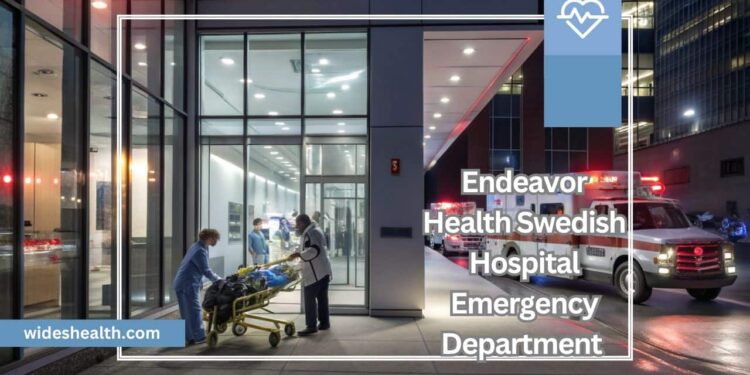When a medical emergency strikes, every second counts. The Endeavor Health Swedish Hospital Emergency Department stands as a beacon of hope, offering expert, compassionate, and immediate care to patients in critical need. With board-certified emergency physicians, cutting-edge technology, and a patient-centered approach, this facility ensures that you receive the best possible treatment when it matters most.
In this detailed guide, we’ll explore everything you need to know about the Endeavor Health Swedish Hospital Emergency Department, including its services, conditions treated, what to expect during a visit, and how it stands out in emergency medical care.
Why Choose Endeavor Health Swedish Hospital Emergency Department?
When faced with a medical crisis, choosing the right emergency department can make all the difference. Here’s why Endeavor Health Swedish Hospital Emergency Department is a trusted choice:
- 24/7 Expert Care: Staffed by board-certified emergency physicians and trauma-trained nurses.
- Advanced Technology: Equipped with the latest medical tools for rapid diagnosis and treatment.
- Seamless Coordination: Works closely with EMS, paramedics, and first responders for faster emergency response.
- Comprehensive Treatment: Addresses a wide range of medical emergencies, from heart attacks to severe injuries.
Whether you’re dealing with chest pain, a broken bone, or a life-threatening allergic reaction, this emergency department is prepared to handle it all.
Conditions Treated at Endeavor Health Swedish Hospital Emergency Department:
The Endeavor Health Swedish Hospital Emergency Department specializes in treating acute and life-threatening conditions, including:
Cardiac Emergencies:
Chest pain at the Endeavor Health Swedish Hospital Emergency Department receives immediate attention, as it may signal a heart attacks or angina. Our cardiac team uses EKGs and blood tests for rapid diagnosis. Irregular heartbeats exceeding 120 BPM are stabilized with medications or cardioversion. Every minute matters in cardiac care—we prioritize swift intervention to prevent heart damage.
Respiratory Distress:
Severe shortness of breath gets urgent evaluation for causes like pneumonia, COPD, or pulmonary embolism. Asthma attacks receive bronchodilators and steroids to restore breathing. Choking incidents require immediate airway clearance procedures. Our respiratory therapists and pulmonologists work together to ensure oxygen levels stabilize quickly using advanced ventilation support when needed.
Neurological Symptoms:
Sudden severe headaches may indicate strokes or aneurysms—we perform CT scans within minutes. Confusion/disorientation triggers assessments for strokes, infections, or metabolic issues. Numbness/weakness undergoes neurological exams to check for stroke or spinal injuries. Our stroke-certified team follows gold-standard protocols to minimize brain damage during critical windows.
Trauma & Injuries:
Compound fractures with bleeding receive wound control and splinting. Head/neck injuries get CT scans to rule out concussions or fractures. Severe burns are treated with specialized dressings and pain management. Our trauma team coordinates with surgeons for cases requiring immediate operative care to prevent complications.
Pediatric Emergencies:
Infants under 3 months with high fevers get sepsis workups, including lumbar punctures. Severe dehydration in children requires IV fluids and electrolyte monitoring. Suspected poisoning cases receive antidotes per Poison Control guidance. Our pediatric ER has child-sized equipment and specialists trained to calm young patients during scary situations.
Other Critical Conditions:
Uncontrolled bleeding leads to blood transfusions and surgical consults. Anaphylaxis gets epinephrine and airway monitoring. Severe abdominal pain prompts an ultrasound/CT to detect appendicitis or internal bleeding. Each case receives tailored protocols—our emergency physicians make rapid decisions to stabilize patients before specialist transfer.
What to Expect During Your Visit?
Visiting an emergency department can be stressful, but knowing what to expect can ease anxiety. Here’s a step-by-step breakdown:
Triage – Prioritizing Urgent Cases!
At Endeavor Health Swedish Hospital Emergency Department, a triage nurse immediately evaluates your symptoms upon arrival. Using standardized protocols, they assess vital signs and injury severity. Life-threatening conditions like chest pain or trauma bypass waiting lines. This system ensures critical patients get seen first while others receive care based on medical urgency. Your wait time depends on symptom severity.
Also read: Mental Health Terminology – Avoid These Common Misconceptions & Stigmas!
Registration & Documentation:
After triage, you’ll complete registration with essential details – name, birth date, symptoms, and insurance information. Our staff verifies this quickly to maintain records. Even if you arrive unconscious, we’ll gather information later. This step helps coordinate care with your primary physician and ensures proper billing. Privacy is strictly maintained throughout the process.
Medical Evaluation:
An emergency physician conducts a thorough examination, reviewing symptoms and medical history. They may order diagnostic tests like blood work, X-rays, or CT scans based on findings. Our in-house lab provides rapid results. Specialists may be consulted for complex cases. This comprehensive evaluation ensures accurate diagnosis before treatment begins.
Treatment Plan:
Once diagnosed, doctors implement tailored treatment – medications via IV or oral routes, wound suturing, or fracture stabilization. For severe cases like heart attacks, immediate interventions are performed. Pain management is prioritized. Some treatments begin while awaiting test results. Our team explains each step, ensuring you understand the care being provided.
Discharge or Hospital Admission:
Stable patients receive detailed discharge instructions including medications, follow-ups, and warning signs. Admission occurs for critical cases needing ongoing care. We coordinate transfers to specialized units if required. Before leaving, all your questions are answered. A summary is sent to your primary doctor for continuity of care.
How Endeavor Health Swedish Hospital ED Stands Out?
The Endeavor Health Swedish Hospital Emergency Department stands apart through its commitment to rapid, specialized care. Unlike standard ERs, it features shorter wait times thanks to an efficient triage system that prioritizes life-threatening cases.
The facility offers advanced trauma care with specialized protocols for critical injuries and pediatric-specific expertise to treat young patients with tailored approaches. Additionally, its seamless integration with hospital specialists ensures patients receive immediate access to cardiologists, neurologists, and surgeons when needed. This combination of speed, expertise, and coordination makes it a top choice for emergency care.
Other Emergencies They Handle:
While I was in the waiting area, I saw people coming in with various conditions. It was clear that no matter the type of medical emergency, the hospital was fully prepared to handle it.
Common Emergency Cases Treated:
| Type of Emergency | Symptoms/Conditions |
| Severe Allergic Reactions | Swelling, difficulty breathing, dizziness, anaphylaxis |
| Head Injuries & Concussions | Loss of consciousness, confusion, nausea, severe headaches |
| Broken Bones & Dislocations | Visible deformity, severe pain, swelling, inability to move |
| Uncontrolled Bleeding | Deep wounds, persistent bleeding, internal bleeding signs |
| Pregnancy-Related Emergencies | Vaginal bleeding, severe abdominal pain, high blood pressure |
| Severe Burns | Blistering, deep tissue damage, extreme pain, infection risk |
| Stroke Symptoms | Numbness, confusion, dizziness, vision loss, trouble speaking |
This format makes it more organized, structured, and easy to read. Let me know if you need any adjustments!
The Emotional Side of Emergency Care:
Sitting in the waiting room, I saw a mix of emotions—fear, anxiety, hope, and relief. Some people were crying, others paced, while some, like me, sat quietly, trying to stay strong. I spoke to an elderly woman whose husband had suffered a stroke.
She gave me a reassuring smile and said, “This hospital saved my husband’s life five years ago. I trust them completely.” Her words brought me comfort, reminding me that emergency rooms aren’t just for treatment—they are places of healing, trust, and second chances.
Also read: D Amore Mental Health – The Best Mental Health Treatment For Lasting Recovery!
The Moment of Relief:
After what felt like an eternity, a doctor approached me with a reassuring smile. “Your father is stable. You can see him now.” At that moment, the overwhelming fear that had consumed me for hours was replaced with pure relief and gratitude. I took a deep breath, preparing myself to see him.
Walking into the hospital room, I saw my father awake, tired but alive. His eyes met mine, and I felt an indescribable sense of comfort. That moment confirmed that he was in capable, caring hands, and hope filled my heart.
A kind nurse entered, offering a warm smile. “We’ll keep him overnight for observation, but he’s doing well. If you need anything, just press this button.” It was these small yet meaningful acts of care that truly made a difference. The hospital wasn’t just about treatment—it was about compassion, reassurance, and healing for both patients and their families.
The Moment of Relief in the Future:
Receiving Reassuring News:
In the future, if I ever face a similar emergency, I know the wait will feel endless. But I will remind myself that at Endeavor Health Swedish Hospital Emergency Department, a doctor will eventually approach with a reassuring smile and say, “Your loved one is stable. You can see them now.” At that moment, fear will turn into relief and gratitude once again.
Seeing a Loved One Safe:
Walking into the hospital room, I will see my loved one awake, tired but alive, and know they are in capable, caring hands. The emotions I once felt will return, but this time, I will embrace the hope that follows. I will trust that the medical team has done everything possible to ensure the best outcome.
Experiencing Thoughtful Care:
A nurse will step in with a warm smile and say, “We’ll keep them overnight for observation, but they’re doing well. If you need anything, just press this button.” I will once again appreciate these small yet meaningful acts of kindness, knowing that this hospital isn’t just about treatment—it’s about healing, reassurance, and compassionate care for both patients and their families.
FAQS:
1. What should I bring if I need to visit the emergency department?
Bring ID, insurance details, medication list, and medical history if possible. In critical cases, treatment comes first, and paperwork can be completed later. If the patient is unconscious, medical staff proceed with immediate care.
2. How does the hospital prioritize emergency cases?
The hospital uses a triage system, treating patients based on severity, not arrival time. Life-threatening conditions like heart attacks receive immediate care, while less urgent cases may wait. Medical staff continuously assess and adjust priorities as needed.
3. Can family members stay with the patient in the ER?
Usually, one family member or caregiver can stay, but during critical procedures or overcrowding, visitors may need to wait outside. The hospital ensures families receive updates and support while prioritizing patient safety and medical care.
4. What happens if I need specialized treatment beyond the ER?
If needed, the hospital ensures a smooth transition to the right department, such as cardiology or neurology. Specialists collaborate with ER doctors to provide immediate, expert care, ensuring no delays in critical treatment.
5. Does the emergency department offer follow-up care after discharge?
Yes, patients receive detailed discharge instructions, referrals to specialists or primary care doctors, and medication guidance. Follow-up appointments may be recommended to monitor recovery, prevent complications, and ensure continued medical support if necessary.
Conclusion:
The Endeavor Health Swedish Hospital Emergency Department is a place of expert medical care, compassion, and hope. With board-certified physicians, advanced technology, and a patient-first approach, it ensures that every emergency is handled with precision and urgency.
Whether treating a heart attack, severe injury, or respiratory distress, the hospital provides rapid, life-saving interventions. Beyond medical treatment, it offers comfort and reassurance to families during stressful times. In critical moments, this hospital stands as a pillar of trust, healing, and excellence.











